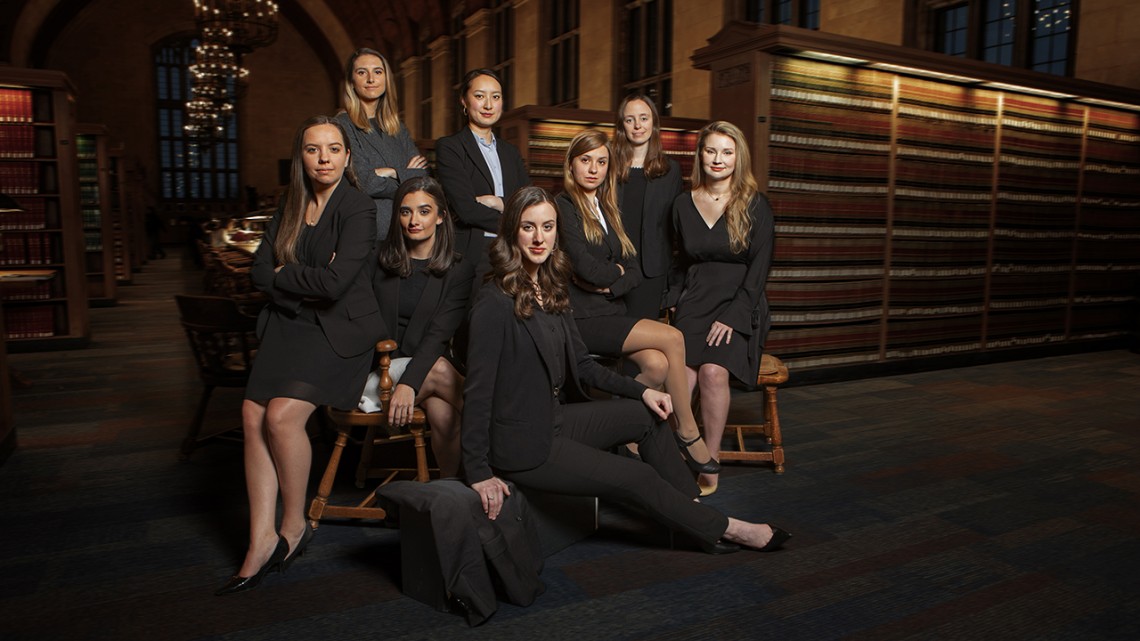
Members of Cornell Law Review's incoming senior board, all second year J.D. students, are, from left, Julia Hollreiser, managing editor; Alessandra Scalise, senior articles editor; Fernanda Pires Merouco, senior online editor; Jialin Yang, senior notes editor; Lauren Kloss, editor-in-chief; and executive editors Grace Brosofsky, Emily Summit and Miranda Herzog.
Ladies first: Law Review elects historic all-female board
By Susan Kelley
For the first time in its history, the Cornell Law Review has elected a senior editorial board made up entirely of women.
The election took place Feb. 2, when the 100 students on the Law Review interviewed and voted on candidates for the board. Founded in 1915, the Law Review is a student-run, student-edited journal that strives to publish novel scholarship that will have an immediate and lasting impact on the legal community.
The new board members believe theirs may be the first all-female senior board among the top 14 law schools in the country. “We’ve been waiting to see if another board comes forward,” said incoming Editor-in-Chief Lauren Kloss, J.D. ’20.
The historic first comes 100 years after Mary Donlon Alger, a 1920 graduate of Cornell Law School, was the first woman elected editor-in-chief of a law review in the United States. She was followed at Cornell by three more female editors-in-chief – the next three in the country.
The fact that the incoming senior board is all women hit home only when they met with the outgoing board, right after the election. “I realized that there were plenty of men on the old board and there were none on this board,” Kloss said. “It was an exciting thing that I don’t think we quite grasped at the start.”
Added Alessandra Scalise, J.D. ’20, incoming senior articles editor: “Our classmates – even people who aren’t on Law Review – are excited to be at a school where this can happen.”
The senior board, composed of second-year J.D. students, will set the editorial agenda for the review’s volume 105, which will consist of seven issues published periodically in 2019. Each issue features articles, essays, book reviews and student notes. Student editors sift through about 500 submissions per week, written by legal scholars including professors, judges and law students. Only 18 articles will make it into volume 105.
“The board shares the desire to form what our version of legal scholarship will look like over the next year,” Kloss said. “If we want to focus on women’s issues, we can. If we want to focus on a security issue, we can. We get to be creative in making a body of work.”
There are still fewer women than men on law school faculties, and unfortunately that lack of representation has carried over into legal academia, Scalise said.
“It is important to us to highlight diverse authors from diverse backgrounds,” she said. “That said, we are trying to publish the strongest pieces, so it’s just one point of consideration when we’re looking at articles.”
Law reviews at top law schools are the premier forms of academic publication for legal academics, said Eduardo M. Peñalver ’94, the Allan R. Tessler Dean of Cornell Law School. “The editorial boards of these publications are the gatekeepers of coveted intellectual real estate that makes or breaks the careers of young legal scholars.”
The senior editorial positions at law reviews also open doors to judicial clerkships and other competitive positions for young law graduates, he said.
“Having a diverse editorial board is important both for the editorial process itself and for the future of the legal profession,” Peñalver said. “I am proud of this new milestone for the Cornell Law Review, which has always held a special place as a pathbreaker for women in the law.”
Kloss noted that she’s surrounded by talented female classmates; the majority of her class are women. And her female professors have been strong mentors who have created new opportunities for female attorneys.
“We see the great step that has been taken, but we’re also very aware of the many more steps that need to happen,” Kloss said. “This is going to be a great year. We could tell that from our very first meeting.”
Media Contact
Get Cornell news delivered right to your inbox.
Subscribe
